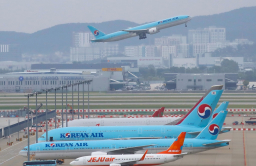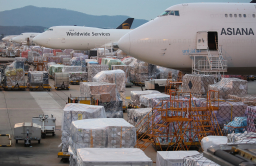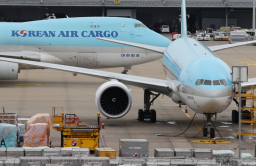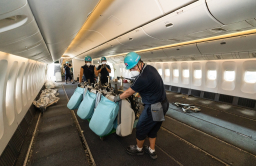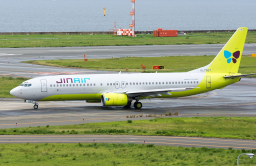-
KOSPI 2577.27 -2.21 -0.09%
-
KOSDAQ 722.52 -7.07 -0.97%
-
KOSPI200 341.49 +0.02 +0.01%
-
USD/KRW 1396 -2.00 0.14%
Korea’s major airlines continue to enjoy cargo boom
Earnings
Korea’s major airlines continue to enjoy cargo boom
Korean Air reports record earnings; domestic LCCs' earnings are expected to improve as government lifts most COVID-19 restrictions
By
May 04, 2022 (Gmt+09:00)
2
Min read
News+
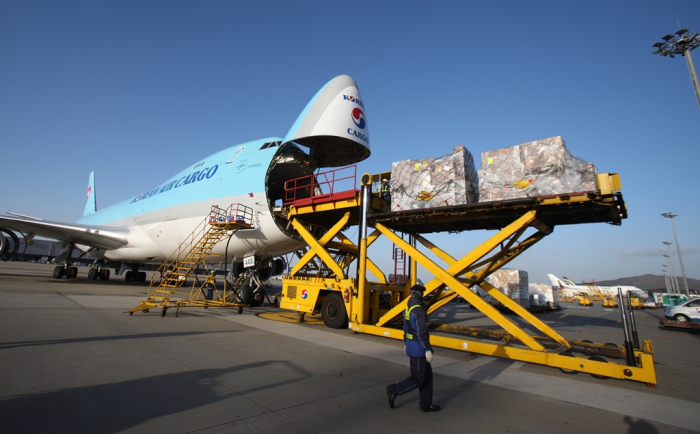
Korean Air Lines Co., the country’s top carrier, reported a record quarterly operating profit on the strong cargo business while its smaller domestic rival Asiana Airlines Inc. was likely to enjoy a similar booster for earnings.
That compared with local budget airlines, which were expected to keep suffering losses due to their heavy reliance on passenger flights. Those low-cost carriers (LCCs) were predicted to find some relief in the second quarter, given the growing demand for international flights, analysts said.
Korean Air said on Wednesday its operating profit surged by more than six times to 788.4 billion won ($623.7 million) in the January-March period, an all-time high for a quarter, on a separate basis, from 124.5 billion won a year earlier. Sales jumped 60.3% to 2.8 trillion won.
Its cargo unit reported sales of 2.1 trillion won in the first quarter, 76.5% of its total revenue. The unit helped the country’s flag carrier report more than tenfold growth to 1.4 trillion won in operating profit last year.
Airfreight rates remained high with global supply chain disruptions sustained despite the recent corrections. Rates for transporting goods in planes from Hong Kong to North America stood at $8.18 per kilogram as of March, up 49.2% from a year earlier, according to the TAC Index, a global air freight rate index.
“The earnings were better than expected as the airline focused on routes, especially ones to the US, which continued to suffer from severe logistics bottlenecks,” said an analyst at a brokerage house in Seoul.
Asiana was estimated to have earned sales of more than 1 trillion won thanks to the cargo boom.
LCC, NOT OUT OF THE WOODS YET
On the other hand, South Korea’s LCCs were expected to keep reporting losses. Jeju Air Co., the country’s largest budget airline, was estimated to have logged an operating loss of 63 billion won in the first quarter, while T’Way Air Co. was likely to have reported a loss of 42 billion won, according to market tracker FnGuide Inc.
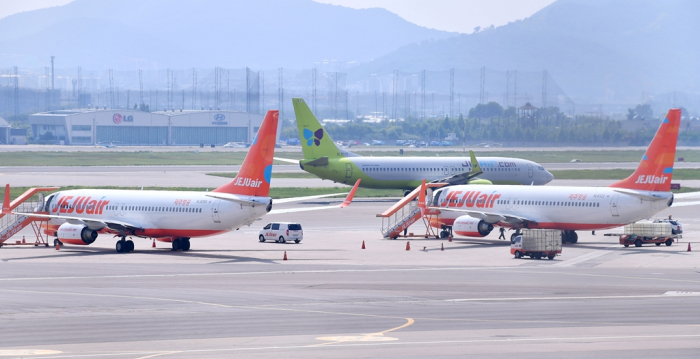
The LCC sector has been in the red for a twelfth straight quarter since the second quarter of 2019 as the industry was one of the hardest-hit businesses by COVID-19.
The industry, however, hoped for a turning point in the second quarter although they have yet to expect profits as demand for international trips grew as the government lifted most restrictions against the pandemic, especially the self-quarantine mandate for vaccinated South Koreans and foreign visitors from other countries. The number of passengers, who used international flights at Incheon International Airport, the country’s main gateway, nearly tripled to 1 million in March and April from 356,812 in the two months in 2021, according to data from the government and the Korea Civil Aviation Association.
“The passenger traffic may have been in an early stage of a recovery,” said a local LCC industry source, adding other measures such as polymerase chain reaction (PCR) tests on entrants must be lifted quickly to see more improvement.
Write to Jeong Min Nam at peux@hankyung.com
Jongwoo Cheon edited this article.
More To Read
-
Mar 14, 2022 (Gmt+09:00)
-
Feb 16, 2022 (Gmt+09:00)
-
Dec 16, 2021 (Gmt+09:00)
-
Aug 02, 2021 (Gmt+09:00)
-
Jul 22, 2021 (Gmt+09:00)


